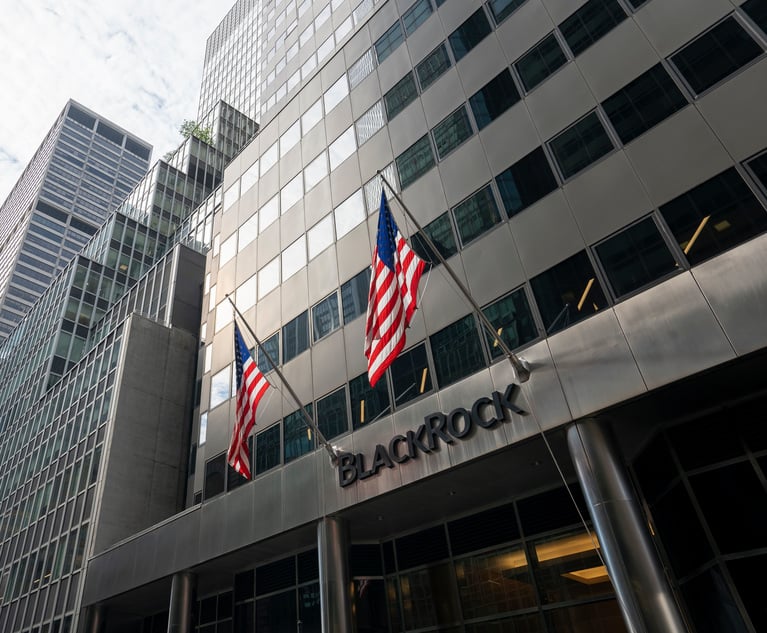DOJ Steps Into Antitrust Class Actions Over 'No Poach' Employee Agreements
The DOJ filed notices Jan. 25 in class actions against two railroad equipment suppliers and cases involving Arby's, Carl's Jr. and Auntie Anne's franchises.
January 31, 2019 at 06:58 PM
7 minute read

Bolstered by recent actions by federal and state regulators, plaintiffs lawyers have filed a raft of class actions alleging agreements not to poach employees violate federal antitrust laws. Now, the U.S. Justice Department is weighing in on their cases.
Most of the lawsuits, filed within the past year, challenge so-called “no poach” agreements that companies have with their franchises over employees, particularly in the services and fast-food restaurant industries. They follow 2016 guidance from the U.S. Department of Justice and investigations of many of the same companies by nearly a dozen state attorneys general.
So far, judges have refused to dismiss cases against McDonald's, Cinnabon and two sandwich shop chains, Jersey Mike's and Jimmy John's. And lawyers are looking at more franchise cases in the pipeline, including six class actions on behalf of H&R Block employees.
“Normally, you can't have an antitrust price fixing damages claim against a single entity for price fixing, so the theory on these cases is the franchises of H&R Block compete with the corporate stores of H&R Block,” said Jason Hartley, of San Diego's Hartley, who has filed one of the H&R Block class actions. “It's a provocative new theory on the franchisee and corporate store cases. That's why I'm pursuing those.”
But the cases are far from slam dunks: This month, the DOJ asked courts for permission to file statements of interest that appear to support the arguments of the defendants, not the employees.
DOJ spokesman Jeremy Edwards declined to comment.
No-poach class actions aren't new. Five years ago, several high-tech companies like Google Inc. and Apple Inc. settled a nationwide no-poach class action for more than $400 million. Several entertainment studios, such as The Walt Disney Co. and DreamWorks Animation LLC, also settled no-poach cases by animation workers.
“They gained a lot of legitimacy with what happened in the high-tech employee case,” Hartley said. “At the outset, they are risky cases. But the evidence, as these cases developed, like in high-tech and to a somewhat less degree the animation case, is compelling factual backgrounds that drive the cases.”
As in the high-tech cases, many of the new class actions parallel allegations by government regulators—in particular, guidance that the Justice Department “intends to proceed criminally against naked wage-fixing or no-poaching agreements,” which it deemed “per se illegal under the antitrust laws.”
On April 3 of last year, the Justice Department settled a civil case against two railroad equipment suppliers over agreements not to poach each other's employees. The case was “part of a broader investigation by the Antitrust Division into naked agreements not to compete for employees—generally referred to as no-poach agreements,” said Assistant Attorney General Makan Delrahim of the Justice Department's Antitrust Division, in a statement at the time.
More than two dozen lawsuits now are pending against both companies, Knorr-Bremse AG and Westinghouse Air Brake Technologies Corp., and have been coordinated into a multidistrict litigation proceeding in U.S. District Court for the Western District of Pennsylvania. A hearing on a motion to dismiss a consolidated class action, brought on behalf of thousands of employees, is set for Feb. 25.
But the newest cases involve franchise agreements. Plaintiffs lawyers argued at a hearing Thursday before the U.S. Judicial Panel on Multidistrict Litigation to create multidistrict litigation for the H&R Block cases, in either Illinois or Missouri.
Fast food restaurants are big targets. On July 9 of last year, attorneys general from 10 states and Washington, D.C., including California, New Jersey, New York and Pennsylvania, wrote a letter to eight restaurants asking about their no-poach agreements. Washington Attorney General Bob Ferguson, in particular, has reached agreements with 39 restaurants, many of which are the same chains now facing class actions. Some states have filed lawsuits. On Jan. 25, King County Superior Court Judge Melinda Young refused to dismiss Ferguson's case against Jersey Mike's.
Other class actions target Arby's, Papa John's Pizza, Little Caesars, Carl's Jr. and Auntie Anne's.
The 'Meat' of the Argument
The cases, citing the DOJ's guidance, allege that the no-poach agreements are unreasonable restraints on the labor trade. Such agreements, the complaints say, reduce employee salaries and opportunities for advancement and, as horizontal restraints, are per se violations of the federal Sherman Act.
Many of the defendants, in moving to dismiss, argue the employees failed to demonstrate that they attempted to work at another franchise or were unable to get a similar job at a different restaurant. Franchises, they argued, were not in competition with each other and were vertical agreements.
They also argued that judges should evaluate the no-poach agreements not as a per se restraint on trade, as the plaintiffs contended, but under the “rule of reason,” which requires employees to establish a relevant market—something the complaints haven't done.
Some plaintiffs have cited a June 25 decision by U.S. District Judge Jorge Alonso in the Northern District of Illinois, who found he had “no trouble concluding” that a no-poach agreement between McDonald's and its franchises could be a per se unlawful horizontal restraint. But he found that some type of analysis, which he called a “quick look” test, was required given that the no-poach provisions were part of franchise agreements.
“Because the restraint alleged in plaintiff's complaint is ancillary to an agreement with a procompetitive effect, the restraint alleged in plaintiff's complaint cannot be deemed unlawful per se,” he wrote.
Plaintiffs also have used a Nov. 13 ruling in the Cinnabon class action, in which U.S. District Judge Robert Bryan of the Western District of Washington, citing the McDonald's case, came to a similar conclusion.
In a July 31 decision, U.S. District Judge Michael Reagan of the Southern District of Illinois also made similar findings in a class action involving Jimmy John's, but he put off the analysis question until later in the case.
Rachel Brass, a San Francisco partner at Gibson, Dunn & Crutcher who represents Jimmy John's and McDonald's, and a plaintiffs attorney in both cases, Richard McCune of McCune Wright Arevalo in Ontario, California, did not respond to requests for comment.
The DOJ's notices, filed Jan. 25, come in cases that have dismissal hearings scheduled next month.
In its notice in the railroad equipment case, the DOJ sought to clarify that no-poach agreements are per se unlawful “unless the facts show that they are reasonably necessary to a separate legitimate business transaction or collaboration between employers.”
Neither Dean Harvey, a partner at San Francisco's Lieff Cabraser Heimann & Bernstein, who is co-lead counsel in those cases, nor defense attorneys Mark Hamer, chairman of Baker McKenzie's North America antitrust practice, and Thomas Birsic, co-practice area leader of the global litigation group at K&L Gates, responded to requests for comment.
The DOJ also filed notices in class actions against Carl's Jr., Auntie Anne's and Arby's. Those notices sought to clarify that a no-poach agreement between a franchisor and franchisee “merits rule of reason analysis at the proper procedural stage” and that a “quick look” assessment “is unlikely to apply for the typical vertical franchisor-franchisee agreements.”
In those cases, defense attorney Bob Atkins, co-chairman of the litigation department at New York's Paul, Weiss, Rifkind, Wharton & Garrison, declined to comment. Plaintiffs' attorney Craig Ackermann, of Ackermann & Tilajef in Tacoma, Washington, who brought all three cases, did not respond to a request for comment.
This content has been archived. It is available through our partners, LexisNexis® and Bloomberg Law.
To view this content, please continue to their sites.
Not a Lexis Subscriber?
Subscribe Now
Not a Bloomberg Law Subscriber?
Subscribe Now
NOT FOR REPRINT
© 2025 ALM Global, LLC, All Rights Reserved. Request academic re-use from www.copyright.com. All other uses, submit a request to [email protected]. For more information visit Asset & Logo Licensing.
You Might Like
View All
Apple Disputes 'Efforts to Manufacture' Imaging Sensor Claims Against iPhone 15 Technology

Special Counsel Jack Smith Prepares Final Report as Trump Opposes Its Release
4 minute read

Who Got the Work: Gibson Dunn and Wilmer to Defend BlackRock in ESG Antitrust Lawsuit
2 minute readTrending Stories
- 1Many LA County Law Firms Remain Open, Mobilize to Support Affected Employees Amid Historic Firestorm
- 2Stevens & Lee Names New Delaware Shareholder
- 3U.S. Supreme Court Denies Trump Effort to Halt Sentencing
- 4From CLO to President: Kevin Boon Takes the Helm at Mysten Labs
- 5How Law Schools Fared on California's July 2024 Bar Exam
Who Got The Work
Michael G. Bongiorno, Andrew Scott Dulberg and Elizabeth E. Driscoll from Wilmer Cutler Pickering Hale and Dorr have stepped in to represent Symbotic Inc., an A.I.-enabled technology platform that focuses on increasing supply chain efficiency, and other defendants in a pending shareholder derivative lawsuit. The case, filed Oct. 2 in Massachusetts District Court by the Brown Law Firm on behalf of Stephen Austen, accuses certain officers and directors of misleading investors in regard to Symbotic's potential for margin growth by failing to disclose that the company was not equipped to timely deploy its systems or manage expenses through project delays. The case, assigned to U.S. District Judge Nathaniel M. Gorton, is 1:24-cv-12522, Austen v. Cohen et al.
Who Got The Work
Edmund Polubinski and Marie Killmond of Davis Polk & Wardwell have entered appearances for data platform software development company MongoDB and other defendants in a pending shareholder derivative lawsuit. The action, filed Oct. 7 in New York Southern District Court by the Brown Law Firm, accuses the company's directors and/or officers of falsely expressing confidence in the company’s restructuring of its sales incentive plan and downplaying the severity of decreases in its upfront commitments. The case is 1:24-cv-07594, Roy v. Ittycheria et al.
Who Got The Work
Amy O. Bruchs and Kurt F. Ellison of Michael Best & Friedrich have entered appearances for Epic Systems Corp. in a pending employment discrimination lawsuit. The suit was filed Sept. 7 in Wisconsin Western District Court by Levine Eisberner LLC and Siri & Glimstad on behalf of a project manager who claims that he was wrongfully terminated after applying for a religious exemption to the defendant's COVID-19 vaccine mandate. The case, assigned to U.S. Magistrate Judge Anita Marie Boor, is 3:24-cv-00630, Secker, Nathan v. Epic Systems Corporation.
Who Got The Work
David X. Sullivan, Thomas J. Finn and Gregory A. Hall from McCarter & English have entered appearances for Sunrun Installation Services in a pending civil rights lawsuit. The complaint was filed Sept. 4 in Connecticut District Court by attorney Robert M. Berke on behalf of former employee George Edward Steins, who was arrested and charged with employing an unregistered home improvement salesperson. The complaint alleges that had Sunrun informed the Connecticut Department of Consumer Protection that the plaintiff's employment had ended in 2017 and that he no longer held Sunrun's home improvement contractor license, he would not have been hit with charges, which were dismissed in May 2024. The case, assigned to U.S. District Judge Jeffrey A. Meyer, is 3:24-cv-01423, Steins v. Sunrun, Inc. et al.
Who Got The Work
Greenberg Traurig shareholder Joshua L. Raskin has entered an appearance for boohoo.com UK Ltd. in a pending patent infringement lawsuit. The suit, filed Sept. 3 in Texas Eastern District Court by Rozier Hardt McDonough on behalf of Alto Dynamics, asserts five patents related to an online shopping platform. The case, assigned to U.S. District Judge Rodney Gilstrap, is 2:24-cv-00719, Alto Dynamics, LLC v. boohoo.com UK Limited.
Featured Firms
Law Offices of Gary Martin Hays & Associates, P.C.
(470) 294-1674
Law Offices of Mark E. Salomone
(857) 444-6468
Smith & Hassler
(713) 739-1250








